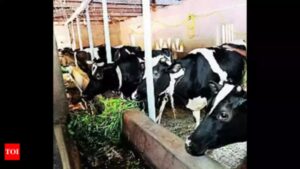Officers attend a training workshop for the 21st National Livestock Census 2024 in Belagavi, in Karnataka, on August 29, 2024.
| Photo Credit: Badiger P. K.
Zilla Panchayat Chief Executive Officer Rahul Shindhe directed officers to ensure that counting methods are scientific and the records are created and maintained in a transparent manner.
“This is the first time the census is being conducted using a mobile application. But then, we should ensure that there are no technical or human errors in the process,” he said.
Enumerators should visit all the houses in the district and get complete information. The data of farmers, category of farmers, age of cattle, should be collected and recorded, along with the details of women involved in cattle rearing. “All care should be taken to see that there are no loopholes,” he said.
“Till now, census data was entered in books. But for the first time, the census will be done through smartphones. An exclusive mobile app called ‘21st Livestock Census’ has been developed by the union Animal Husbandry Department. Enumerators should learn to use the app without errors,” Mr Shindhe said.
“Earlier 200 columns had to be filled in the book. This time, information can be entered quickly through the app. The app is designed to work even in places without mobile networks,” he said.
The data should include use of vaccines and medicines for livestock.
“The Animal Husbandry Department has been preparing for this massive survey programme for the past four months. Already, a total of eight master trainers in the district have received training in the first phase in August,” Deputy Director Rajiv Koler said.
Master Trainers Anand Patil and Virupaksha Addanagi addressed the officers.
Livestock census has been going on since 1919. There have been 20 censuses in the last 100 years. This will be the 21st Livestock Census.
Its purpose is to prepare the next plan of the governments based on the census. The data will be used for formulating policies and programmes for farmers and the dairy sector.
Officers will include data from goshalas (shelter for stray cows) too.
Data will be obtained on cattle, ox, buffalo, cow, goat, sheep, chicken, dog, horse, pig, duck and emu birds reared by livestock farmers. Information on stray cattle and dogs is also included. Data on elephants, and cattle in temples will be collected. Any place that has more than 10 cattle, 1,000 chickens, and 50 goats will be considered as a farm.
The operation will be massive. As many as 247 enumerators and 54 supervisors will be involved in Belagavi district, which has 3,24,584 families in urban areas and 8,35,657 families in rural areas.






